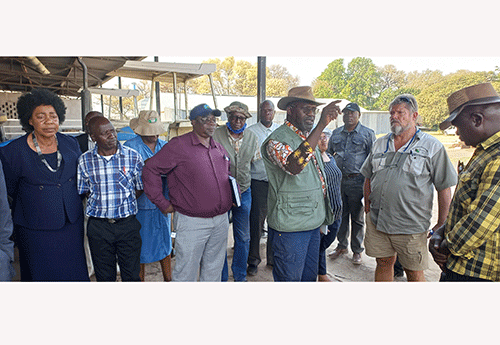National Council member Paulus Mbangu has opposed the government’s offer to lease green schemes and one dairy venture to investors, arguing local people can successfully run the government’s multi-million-dollar projects.
Outspoken Mbangu, who is the Rundu Rural constituency councillor, opposed the leasing of the projects, saying the impact of these green schemes is yet to be felt in the Kavango East and West regions.
“Besides, all green schemes are unproductive. It is in this vein we are calling for the green schemes to be decentralised to the regional council. Our people have the capacity to run the green schemes” he remarked. This comes after the government’s offer of investment opportunities in four brownfield green scheme projects and one dairy project to the domestic private sector.
Mbangu, a former Swapo Party Youth League secretary for labour, said it is clear the orthodox economic policies and traditional strategies to foster growth – as promoted by various institutions and so often uncritically embraced – are insufficient to address and redress inequality and poverty.
National data, census and statistics indicate the two Kavango regions are the poorest in Namibia.
However, Mbangu charged there has been an observed trend from the side of the government to ignore statistical facts and realities in addressing the specific situations of those specific communities or regions.
“Kavango East region is the region with the most number of green schemes, yet one of the poorest, why? Because the placement of small scale farmers is decentralised and more than 90% of the small scale farmers in green schemes are people from other regions, while residents are mere spectators,” Mbangu remarked.
Instead, he suggested, more emphasis needs to be placed on laying institutional and social foundations for structural changes that will facilitate a meaningful development process and a systematic redistribution of resources.
Secretary general of the All People’s Party Vincent Kanyetu said it is a sad episode that Namibia always consumes food from South Africa and other parts of the world while “we have these projects under-utilised”.
“It should be a lesson for us, as a nation, that during the time of the Covid-19 outbreak, we almost went dry in all our shops around Namibia. Let us take this opportunity that has come – be it in whatever form that has challenged us,” he said.
“Let us give priority to residents of these regions and other Namibians so we grow our own tomatoes and cabbage to feed ourselves and the nation. Our stance, as a party, is that we will never support foreigners occupying all the green schemes in Kavango. We will only support the move that green schemes are allocated to Namibian citizens. If other people in their countries are producing food, what’s wrong with us? We cannot privatise everything in the country. Government must support locals so they produce food – going forward.”
He said the decision is received with mixed feelings in both Kavango regions.
According to him, people on the ground, the traditional authorities, political leaders and ordinary Namibians feel it is not fair to lease out the projects to investors at the expense of locals.
“People feel it’s just fair for the ministry and government to give priority to Namibian citizens, regardless of where they come from before considering any foreigner or investor.
“Regional, traditional and political leaders should be included in the planning and consultation pertaining to this development,” he suggested.
Hambukushu senior headman Erwin Disho said the traditional authority is waiting for senior officials from the land reform ministry to meet them on the issue before they could comment.
The proposed development also includes international investors with the capacity to operate the schemes through a competitive bidding process through public-private partnerships.
Agriculture deputy minister Anna Shiweda made the announcement recently during a virtual meeting of the 2022 World Economic Forum in Davos, Switzerland, on agriculture investment opportunities in Namibia.
These are projects for which land is already secured.
Although it is not an eligibility requirement, she said joint ventures between local and foreign investors are encouraged and supported.
The green scheme programme encourages the development of irrigated agronomic production with a target to place approximately 27 000 hectares under irrigation.
The scheme sites are situated along the shared perennial rivers along Namibia’s borders, where water is abundant.
The investments are expected to promote the production of grains and cereals as a basic staple food to reach food self-sufficiency while allowing investors to diversify production into high-value horticulture, crops and fruits.
The AgriBusDev was established to monitor and create an ideal environment for achieving the objectives of the green schemes as articulated by the Green Scheme Policy of 2008.
AgriBusDev was in charge of 11 green scheme projects established by the government.
Over the years, it failed to manage the green schemes.
This led to about 5 600 out of 8 950 hectares being under irrigation.
AgriBusDev continuously fumbled its mandate and relied on the agriculture ministry for bailouts.
Cabinet then decided to dissolve AgriBusdev and transfer the staff to the agriculture ministry.
– anakale@nepc.com.na


